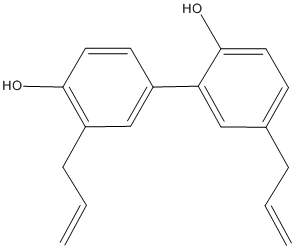All AbMole products are for research use only, cannot be used for human consumption.

Honokiol is a biphenolic compound present in the cones, bark, and leaves of Magnolia grandifloris. It inhibits phosphorylation of Akt, p44/42 mitogen-activated protein kinase (MAPK), and src. Additionally, honokiol modulates the nuclear factor kappa B (NF-κB) activation pathway, an upstream effector of vascular endothelial growth factor (VEGF), cyclooxygenase 2 (COX-2), and MCL1, all significant pro-angiogenic and survival factors. Honokiol induces caspase-dependent apoptosis in a TRAIL-mediated manner, and potentiates the pro-apoptotic effects of doxorubicin and other etoposides. Honokiol has been shown to promote neurite outgrowth and have neuroprotective effects in rat cortical neurons.
| Molecular Weight | 266.33 |
| Formula | C18H18O2 |
| CAS Number | 35354-74-6 |
| Solubility (25°C) | DMSO 36 mg/mL |
| Storage |
Powder -20°C 3 years ; 4°C 2 years In solvent -80°C 6 months ; -20°C 1 month |
| Related Akt Products |
|---|
| ZINC00784494
ZINC00784494 is a specific Lipocalin-2 (LCN2) inhibitor. ZINC00784494 inhibits cell proliferation, cell viability and reduces AKT phosphorylation levels in SUM149 cells. |
| (E)-Akt inhibitor-IV
(E)-Akt inhibitor-IV is a PI3K-Akt inhibitor, with potent cytotoxic. |
| K-80003
K-80003 is a potent inhibitor of tRXRα-dependent Akt activation and cancer cell growth. |
| FPA-124
FPA-124, a cell-permeable copper complex, is a selective Akt inhibitor with an IC50 of 0.1 μM. |
| SPOP-IN-1
SPOP-IN-1 is a selective SPOP E3 ubiquitin ligase inhibitor. |
All AbMole products are for research use only, cannot be used for human consumption or veterinary use. We do not provide products or services to individuals. Please comply with the intended use and do not use AbMole products for any other purpose.


Products are for research use only. Not for human use. We do not sell to patients.
© Copyright 2010-2024 AbMole BioScience. All Rights Reserved.
